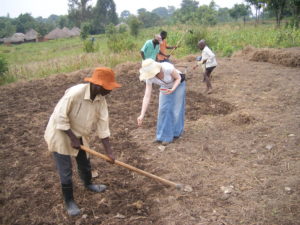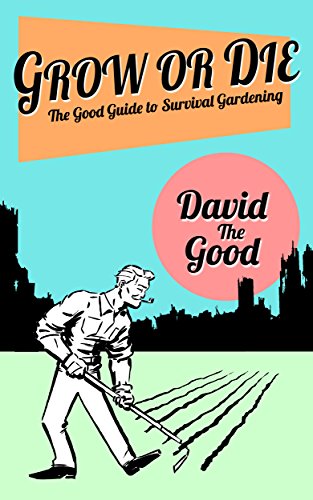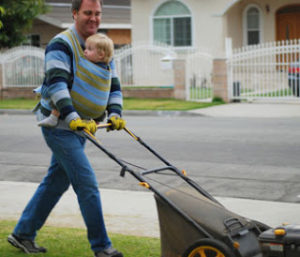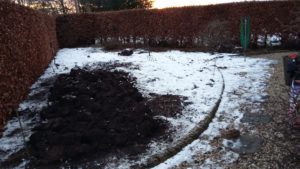How to Reconnect With The Land (And Ensure Your Kids’ Survival)
Let me start with a question: How connected are you to the land? I’m talking about the mucky, gritty stuff that you grow things in.
Do you know how to grow and raise crops or trees or do you (and your children) think that milk comes from cartons and potatoes from the vegetable aisle.
The truth is that our increasingly urbanised population is losing touch with the outdoors and the land in particular. My son recently asked me what factory the pork he was eating came from. It did give me a chance to explain to him what a butcher does.
Rewind 200 years or so and you’re in the days before the industrial revolution. You probably live in the country and you definitely don’t have electricity, the internet or supermarkets. Where does your food come from?
Farming in Europe has been around for 4000 years and in other parts of the world for much longer. So your ancestors were raising animals and crops, hunting and foraging for millennia before the recent few decades in which we’ve lost much of this knowledge.
When I lived in Uganda, even city dwellers had small farms (called shambas) on the outskirts of their city or near their home villages. In the rural areas everyone grew their own crops and raised their own animals – even me.
Farming was a family affair with young children working along side their parents. One farmer who came to help me sow peanuts brought his eight year old son to drop the red seed into the small holes he was scraping.
This seems like a foreign culture now – of sons and daughters helping to grow the family’s food. Farming is done on an industrial scale and food can be bought so cheaply that no-one really has any need to raise their own.
Yet.

Sowing peanuts is a family event. The seed is quickly covered to discourage birds or other children from grabbing a snack.
The Tree Stump Philosopher
“Daddy, what are you doing?” My son sidled over cautiously.
“Digging this stump out.” I replied breathlessly. “Want to help?”
The tree – a planted yew had hard wiry roots and a large, flat root plate. I’d dug a trench about three feet in diameter and was starting to dig and lever up the heavy stump.
We’ve only moved to the new house a few weeks ago but I’ve was making use of fair weather to get some clearance work done on the largely neglected garden.
I needed this stump out as I plan to convert the area to a grass lawn for the purposes of football, rugby and tickle fights. But in the meantime I wanted the land for the first crop of potatoes, beans and turnips.
Moving from the city to the country was something we’d wanted to do. Growing our own food on any scale was out of the question.
But as I dug I thought to myself: How many young men my age or boys my son’s age would know how to dig up a stump like this? A few generations ago, most Dads would have been able to clear a plot of ground ready for cultivation. But now I’m in the minority.
Is it a teaching gap? After all I can’t teach my son quantum physics because I don’t know anything about it. So if you’re a father who knows little of the land, where do you start in passing on important knowledge that you don’t already possess?
And does it even matter? My local German discount supermarket sells almost every food I’ll ever need (not espresso coffee though – don’t get me started).
Why waste the time growing my own food – not a great return on time invested when I could be starting another website or writing or managing my investments.
Why Living From the Land Matters
Knowing how to grow and survive from the land is something that is an inherent part of our culture and past. If we lose it it is gone forever. Books and learning can help but are a poor substitute for the way I learned – standing at my fathers elbow as he showed me how to dig a plot, plant vegetables and watch them grow into something I wanted to eat. Is this really that important? Let me explain more:
It’s in Your Heritage
It doesn’t matter if you’re heritage is from the Siberian steppes, northern Europe or east Africa, your ancestors depended on the land for their food. Mine were almost certainly farmers back in ancient times, raising animals and crops to feed themselves. My more recent ancestors were farmers too.
The truth is that there is a strong heritable link between you and the land. If you’ve lost it, isn’t it time you got it back?
The best way to teach yourself about growing your own food is to start now and experiment. Learn by doing. These days YouTube provides you with nearly all the gardening advice you’ll need but I also recommend ‘Grow or Die’ by David The Good and his prequel ‘Compost Everything’ is also excellent. He does have a US focus but provides plenty for a Northern European like me to think about when it comes to crop selection and garden layout.

This is The Time of Plenty
A few generations ago, people in the UK were dying from starvation. There wasn’t enough food and it was expensive to buy. Over a million Irish and Scots emigrated to America following the great potato famine which destroyed crops as well as lives.
Hunger was a regular feature of life. But now we have the opposite problem: obesity. We have access to too much food. And not just junk food.
Our grandparents and great grandparents would barely be able to believe the abundance of foodstuffs we have access to. My own father, who lived through the second world war, remembers the first time he saw a banana. He was 10. Now bananas are a few pennies each.
We live in a time of plenty – don’t let anyone tell you otherwise. But will that continue indefinitely. There is a type of cognitive bias called ‘continuity bias’ which means that we expect the current status quo to remain indefinitely.
But that’s flawed thinking. The captain of the Titanic was famously quoted as saying he’d never been shipwrecked or even been close to being shipwrecked. Tragically, we know what happened to him.
Nicholas Nassim Taleb’s ‘Black Swan’ event is something that no-one sees coming because they think it’s impossible. But how stable is our society and more importantly, our food supply?
Right now our supply of food is totally dependent on oil. Synthetic fertilisers, farm machinery, delivery vehicles, supermarkets – all need one thing to produce: oil. Which is great. I mean we have total control over all of our oil and none of it comes from unstable places like the Middle East and West Africa.
Does it?
It wouldn’t take much to cut global oil production significantly – think something along the lines of the 1956 Suez Crisis when the Suez canal was closed to shipping from October 1956 to March 1957. Food prices skyrocket and it becomes a challenge just to put food on the table. Are you ready for that altogether possible scenario?
While our recent times have been stable and peaceable, there is no guarantee that this will continue indefinitely. Like a roulette wheel that seems stuck on red, it will switch to black at some stage.
What do you need to do to make you and your family’s future more secure? Start a survival garden? Rent an allotment. Borrow a section of a friends garden to grow your own crops? Being passive is what everyone else is doing. Can you afford to do the same?
Return on Investment – Your Wealth is in the Soil
You’ve probably heard this asked: ‘What’s the return on investment on that?’. It’s normally used to justify (or otherwise) some type of activity. If you value your time, you already care about return on investment even if you’ve never called it that before. It’s a fancy way of saying ‘Is this worth my time’?
Here’s an example. I used to wash my 2 cars. It would take me most of my Saturday afternoon to get them absolutely gleaming and polished so that water didn’t so much bead as be utterly repelled. The rain would retreat back to the clouds when I drove in downpours on the strength of my resin coating alone.
But the return on investment was poor. I’d spend 2 to 3 hours on the cars – time which I could have spent better, doing other things. I was lucky to have a good drive thru car wash down the street where I could get both cars reasonably clean in minutes for a few pounds. It would have been better to go there than waste my valuable free time on something as mundane as car-washing.
You could say the same about growing your own food. It’s a poor return on investment. I can get a sack of potatoes for the same price as washing one of my car. So why would I spend hours outside growing my own? The supermarket vegetable aisle holds more delicious produce than I could grow in a lifetime.
What if this misses the point completely? That growing food isn’t about saving money on your grocery bill. It’s about learning (or re-learning) a near forgotten skill that your ancestors took for granted.
It’s about taking that knowledge and creating something (yummy food) ex nihlo – out of nothing. It’s about that look in your children’s eyes when you show them their first swelling pumpkin or pluck a carrot from the loose sandy soil.
Reconnecting with the land isn’t about the destination – in this case having food to eat. It’s about the journey; the process you’ll go on with your kids; the delight in their eyes and the inevitable disappointment of failed crops.
Those are lessons worth learning for now and for the future – what ever it may bring. When the end result is reconnecting with a forgotten past coupled with possible future survival, that return outstrips the time invested a hundred fold.
How To Use Your Garden to Teach About Life
My favourite part of coming home from boyhood summer holidays was seeing how much my vegetable patch had grown.
One year was extra exciting: It was the first year I’d grown radishes. As we pulled into the drive, I bounded out of the car and round to the back garden. My small allotment was like a jungle and the radish leaves were ginormous!
I started pulling to see what size they had grown to. But I was quickly disappointed as I saw that they were all small and deformed little morsels. I’d forgotten to thin out the small plants which meant the crop was a failure. I probably cried – I don’t really remember. Being a farmer at 7 is tough.
But I learned 2 things. Firstly always thin out your seedlings or you’ll cry. And secondly, sometimes life has bitter disappointment. Things don’t always go your way. There aren’t always bulbous radishes waiting for you. But you can come back stronger and wiser than before.
Don’t kid yourself that none of this matters. It does. It matters very much, both now and for the future. I’m no doomsday prepper, but that doesn’t mean I don’t believe in being prepared for whatever the future brings. A cursory glance at the history books suggests out time of relative peace is on borrowed time. What comes next? I don’t know – but at least I won’t go hungry.
Take time to learn these skills for yourself, experiment and learn with your children. Teach them about life and re-learn the skills nearly lost to our modern, silver spoon sucking generation.
Neil
P.S. Liked this? Then you’ll enjoy my regular emails which you can get here.
P.P.S This is an edited excerpt from my new book which is due out later in 2017. Sign up to my newsletter and I’ll send you a free copy when it’s done!


